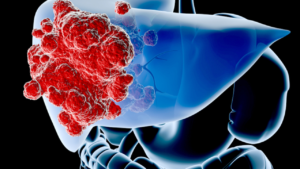Stage 4 liver Cancer

What is liver cancer ?
In simple words, liver cancer starts in the liver, but its effects extend far beyond that. Think of your liver as a vital factory in your body, constantly working to make sure everything runs smoothly. It’s like the unsung hero, performing vital functions like filtering toxins from your blood, aiding digestion and storing energy.
Now, when the cells in the liver start growing out of control and take the form of a lump or tumor, then we call it liver cancer. These tumors can be either benign (noncancerous) or malignant (cancerous). Malignant tumors are the ones we worry about because they can spread to other parts of the body, making treatment more challenging.
Stage 4 liver Cancer ?
Stage 4 liver cancer is an advanced and serious condition where the cancer has spread extensively within the liver and may also spread to other organs or parts of the body. At this stage, the cancer is considered inoperable, meaning it cannot be completely removed through surgery.
When someone is diagnosed with stage 4 liver cancer, it often means that the cancer has reached a point where it is difficult to treat and manage. The primary goals of treatment at this stage are usually to manage symptoms, improve quality of life, and slow disease progression.
Symptoms of stage 4 liver cancer can include severe stomach pain, jaundice (yellowing of the skin and eyes), significant weight loss, loss of appetite, extreme fatigue, and swelling in the abdomen due to fluid buildup.
Treatment options for stage 4 liver cancer may include chemotherapy, targeted therapy, immunotherapy, radiation therapy, and palliative care. Palliative care focuses on providing relief from symptoms and improving quality of life rather than curing cancer.
It is important for individuals with stage 4 liver cancer to work with their health care team to develop a treatment plan that best suits their needs and goals. Additionally, seeking support from loved ones and joining support groups can provide valuable emotional support during this challenging time.
While stage 4 liver cancer is a serious diagnosis, advances in medical research and treatment options provide hope and improve outcomes for individuals living with this condition. It is important to remain optimistic and proactive in managing the disease, while also focusing on maintaining the best quality of life.
Click Here- heart-attack-symptoms-and-treatment-2024
Liver cancer symptoms and treatments. ?
Liver cancer often shows no symptoms in the early stages, which is why it can be difficult to detect. But as it progresses, symptoms may appear, such as stomach pain, abdominal swelling, unexplained weight loss, yellowing of the skin and eyes (jaundice), and feeling unusually tired or weak.
Many things can raise the chances of getting liver cancer. Chronic infection with hepatitis B or C viruses, excessive alcohol consumption, exposure to certain toxins such as aflatoxin (which can be found in moldy grains and nuts), and having liver disease such as cirrhosis can increase the risk.
It is also important to understand the different types of liver cancer. The most common type is hepatocellular carcinoma (HCC), which begins in the main type of liver cell called hepatocytes. There are other types, such as intrahepatic cholangiocarcinoma, which starts in the bile ducts inside the liver, and hepatoblastoma, which is a rare type usually found in children.
Liver cancer treatment often involves a combination of several approaches, depending on factors such as the stage of the cancer, overall health, and the patient’s personal preferences. Treatment options include surgery to remove the tumor, chemotherapy, radiation therapy, targeted therapy (which targets specific abnormalities in cancer cells), immunotherapy (which helps the immune system fight the cancer), and in some cases , may include liver transplantation.
Research into liver cancer continues, with scientists working hard to find better ways to detect, prevent, and treat this disease. Early detection through screening programs, advances in treatment options, and lifestyle changes to reduce risk factors are all important steps in the fight against liver cancer.
In short, liver cancer is a complex disease that affects a vital organ responsible for many functions in the body. It is important to understand its causes, symptoms, and treatment options to improve early detection and outcomes for people affected by this condition.
Solution:
Surgery: In some cases, surgeons may remove the tumor from the liver if the tumor has not spread extensively. The purpose of this procedure, called liver resection, is to remove the cancerous tissue and potentially cure it if the cancer has not spread beyond the liver.
Liver transplant: For some patients with early-stage liver cancer and severe liver disease (cirrhosis), liver transplant may be an option. During a liver transplant, the diseased liver is replaced with a healthy liver obtained from a donor. This approach may offer a chance of cure, especially if the cancer has not spread beyond the liver.
Ablation therapy: This treatment involves using heat (radiofrequency ablation) or cold (cryoablation) to destroy cancer cells in the liver. It is often used for small liver tumors that are not suitable for surgery or when surgery is not an option.
Embolization: Embolization techniques, such as transarterial chemoembolization (TACE) or radioembolization (TARE), involve blocking the blood supply to the tumor while delivering chemotherapy drugs or radiation directly to the cancer tissue. This approach may help shrink the tumor and improve symptoms.
Targeted therapy: Targeted therapy drugs are designed to specifically target and attack cancer cells while sparing healthy cells. Drugs such as sorafenib and lenvatinib are examples of targeted therapies approved to treat advanced liver cancer.
Immunotherapy: Immunotherapy works by using the body’s immune system to recognize and destroy cancer cells.
Chemotherapy: Chemotherapy drugs are used to kill cancer cells or stop them from growing. Although traditional chemotherapy may not be as effective for liver cancer, it may still be used in conjunction with other treatments or to help manage the disease in certain situations.
Clinical trials: Clinical trials provide access to experimental treatments and therapies that are not yet widely available. Participating in clinical trials can provide access to cutting-edge treatments and contribute to advances in liver cancer care.
It is important for individuals with liver cancer to discuss treatment options with their health care team to determine the most appropriate approach based on the stage of cancer, overall health, and personal preferences.









